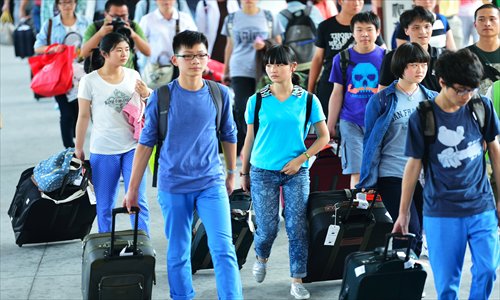Study tour standards crashing?

Students from Jiangshan High School in Zhejiang Province return home on Sunday after being in a plane crash that occurred in San Francisco on July 6. The students had been heading to the US for a summer camp. Photo: CFP
A girl died on Saturday in a hospital in San Francisco, making her the third Chinese victim of a plane crash that occurred on July 6. The Boeing 777 was packed with Chinese students heading to summer camps in the US.
When the Zhejiang government learned the organizer of one of the summer camps was operating without the appropriate qualifications, it swiftly cracked down on sending Zhejiang students to overseas summer camps, amid public scrutiny over their safety.
The organizer of the camp, the Zhenjiang Boyue International Communication Consulting Company, based in Jiangsu Province, did not have the qualifications to organize a summer camp, according to authorities from Zhejiang and Jiangsu provinces, the Xinhua News Agency reported.
The company was founded in December 2005, but is neither affiliated with education authorities, nor is it a qualified travel agency.
However, before the company was exposed in media reports in the wake of the crash, it had cooperated with the school to organize summer camps for seven years. The 15-day study tour this summer charged about 30,000 yuan ($4,887) from each student and was approved by the Jiangshan education bureau, the Qianjiang Evening News reported.
Cracking down
Just one day after the plane crash, the Quzhou education bureau cracked down on a range of summer camps. On July 8, the Zhejiang provincial education department issued a notice requiring all high and primary schools in the province to investigate overseas summer camps. Schools that hadn't signed contracts related to summer camps were told to delay travel plans.
The notice also said that summer and winter camps and study tours organized by schools should not pursue profit. It specifically stipulated that the costs incurred by teachers while on these trips should not be covered by the fees paid by students, the Qianjiang Evening News reported.
"Study tours should not be halted just because of one individual case," Zhang Shangzheng, a tourism management professor with Anhui University, told the Global Times. "Learning through travel is good for students to broaden their horizons. The authorities should instead strengthen supervision over study tours. "
In most cases, each student is charged 30,000 yuan to 50,000 yuan for a stay of around two weeks. The US and European countries tend to be the most popular, Zhang Xing (pseudonym), a manager from the overseas study tour department of an education consulting company in Beijing, told the Global Times.
"Flight tickets account for a large percentage in all costs and the rest are travel costs. But there is still a lot of profit to be made," he said.
Although these study tours are more expensive than a normal overseas trip would be, they remain popular among wealthy families. Candidates are selected via interviews in English, Zhang said, adding that they usually arrange one teacher for every 10 students and the time for study and travel is equally divided.
Suspect qualifications
According to a notice released in April 2012 by four national government departments, including the Ministry of Education and Ministry of Foreign Affairs, schools should be the organizers of overseas winter and summer camps for primary and high school students. The organizers can also be international education communication institutions supervised by education authorities or the communist youth league, young pioneers organizations or women's federations. They can also entrust duties to travel agencies who have permission for exit and entry services from the China National Tourism Administration.
The popularity of these camps, as well as the high profits, have made them a popular money-making scheme. Despite the recent notices, a lack of supervision means it is easy for companies to find customers.
"As a result, standards in the industry have become lower while competition is more fierce," Zhang said.
Many institutions offer dubious quality in terms of meals, accommodation and tour guides, and there are even traps to push students to make purchases, Zhao Peng, an insider within the study abroad industry in Beijing, told the Legal Daily.
Zhao also said that "some overseas travel agencies turn study tours into shopping tours by adding items such as scenic spots and shopping centers into their original plans."
Student impressions
Students' impressions of these camps are mixed.
Kang Liang, a graduate student from the Shanghai-based Fudan University, who spent 80,000 yuan on a 15-day summer camp in the US in December, regrets his choice.
"The accommodation and service were poor," Kang told Xinhua. "We were taken to visit parks and campuses, which was not as good as visiting scenic spots in China."
However, for Li Wendi, a junior from the South-Central University for Nationalities in Wuhan, Hubei Province, a 15-day study tour in the US in February helped him score an internship at a famous IT company in Shenzhen, Guangdong Province.
"The company's interviewers thought I had broader horizons than other candidates," Li said. "I just said what I learnt during the study tour."
Many study tour organizations promote their business by stressing that the travel plans include famous universities, the headquarters of the UN and well-known capital city landmarks. But these places are free to visit.
According to a teacher in charge of an overseas cooperation office at a Shanghai university, the profits the university received from overseas summer camps, training classes and study tours were more than 10 million yuan in 2012, Xinhua reported.
Chu Zhaohui, a researcher at the National Institute of Education Sciences, said that the commercialization of the sector is a problem. "It should not be run as a lucrative industry and should not be conducted at a shallow level. Students should be given more chances to interact with locals, which is the real charm of overseas study tours."